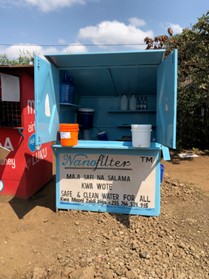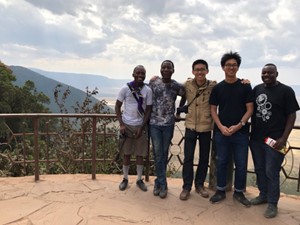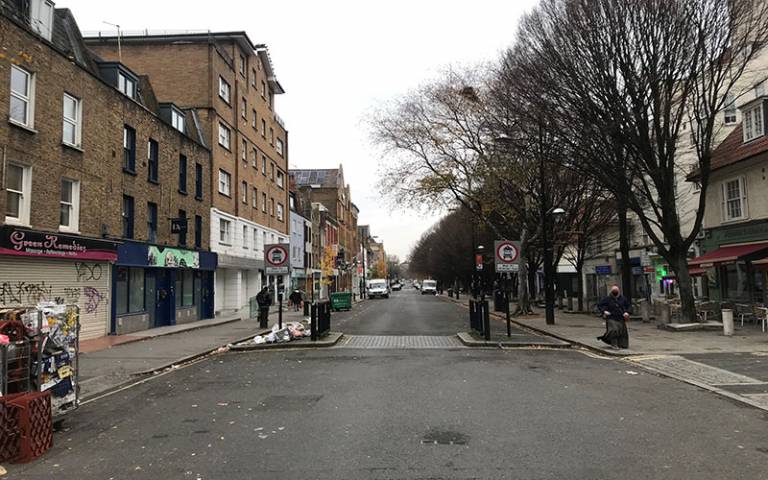“Learning that oranges are meant to be green”
By ID Hub, on 1 February 2023
It is impossible to capture all the extraordinary experiences we had in such a short post. From learning that oranges are meant to be green, to actually seeing chickens fly, these are images that a city boy like me, will never forget. However for the sake of this post, I’ll share insights from the work we did in Arusha, Tanzania…
In collaboration with the Royal Academy of Engineering, UCL offered us a one of a kind placement to collaborate with an amazing entrepreneur in Tanzania. During this time, we worked with Dr Askwar Hilonga, a local scientist and entrepreneur whose main priority is providing clean drinking water to the local population with his patented NanofilterTM, selling affordable filtered water in kiosks, in and around Arusha.
Our time there was limited, so we quickly got to work in getting acquainted with the problems at hand, that we were tasked to help with. Essentially, the company was facing an issue of dishonesty from its operators at the water stations and there was also the need for a system to collect, process, and verify sales information completed.

A Water Station
To better understand the problems, we conducted field research on our third day. At the time, customers would come to the stand, buy either refills or bottled water, pay in cash, and the operator would note down the purchase. When the operators closed for the day, they would bring the cash collected to a mobile money station, top up their mobile phones, and transfer the day’s revenue to the company via the mobile M-PESA service. By the end of that day, we could start to see the lack of checks and balances in place at the water stations, as that the company is largely relying on the operators’ initiatives to report sales and submit revenue on time.

A sales ledger taken by the operator
Henceforth, we set about installing a locked and shielded water meter at a test kiosk outside the company main office. The purpose of a water meter is obvious, but the simple idea to lock the meter up had further implications. By doing so, we created an imbalance in information. The operator could still find ways to cheat the system, such as disconnecting the meter, or manipulating the tap’s flow rate. However, this lock would deter such behaviour by enabling accurate readings of the meter and disabling a reset. This would now allow the organisation a human-free and independent parameter that can be crosschecked with sales submissions and transactions made by the operators to the company, in order to ascertain the authenticity of that station’s performance.
On top of that, we also initiated the process to acquire an API from Vodacom to view and in turn, assisted the company in verifying the transactions made by the operators to the company. We were also able to evaluate the July performance data from the water stations, to get a glimpse of the scale of the initial problem, though the numbers were not entirely authentic since at that stage, the company did not have an independent avenue to verify the records. Nevertheless, the findings highlighted the situation most certainly needed attention.

A locked water meter
In general, we were humbled to have worked with an accomplished academic that has climbed all the way from the bottom and is now working to better his community, addressing their actual concerns. His vision of inspiring and empowering the locals in order to create a self-sustainable future, driven by innovation from fellow Africans resonates very strongly with me. As the saying goes, teach a man to fish, and you feed him for life. The power of entrepreneurship lies precisely in its ability to drive entire industries and supply chains, creating a domino effect that provides numerous employment opportunities. Dr Hilonga’s vision goes a step further, to better the lives of the people both in terms of health and wealth, and it is a vision that I, along with countless others, hope will succeed. The reality however as we eventually understood, was far more challenging than setting a goal. Perhaps we all had a rosy success story of the company in our heads when we first arrived, but the struggle continues everyday.
To all prospective interns thinking about applying, do so with a desire to learn, to contribute, and to be inspired.

Dylan and amazing employees from Gongali Model
With thanks to Yanzhe Wen, UCL Chemical Engineering Alumni who participated in the Engineering a Better World Programme in 2018.
Creating a New Narrative for Iraq
By ID Hub, on 9 December 2022
Iraqi Innovators is a social innovation startup, founded by Zahra Shah and Amara Bandukada. Its mission is to nurture and develop local talent, business, and technology in Iraq through quality content, community, training, and women-only spaces. Their current plans are to tackle digital poverty in Iraq and understand more about the extent of digital literacy in the country.

Zahra has an MA in International Relations from Leiden University and for the past six years, has worked in growing start-ups and tech ecosystems in conflict-affected countries, including Gaza and Iraq.
Iraqi Innovators
Having spent two years in Iraq running coding bootcamps, accelerators, and co-working spaces, Zahra went on to launch a joint venture with Amara in 2018. Iraqi Innovators is a women-led, 7-person team located across Iraq and in London.

The team has a vision to build an Iraq with ample job opportunities, for a highly skilled, local workforce in a flourishing tech and startup sector. Their impact to date has led to over 200 tech and start-up related published articles, 19 live sessions and a community of over 10,000 people across Iraq.
In partnership with ‘We Are Digital’, who have been tackling Digital Literacy in the UK, Iraqi Innovators is launching a digital literacy training program in Iraq. The aim will be to increase digital connectivity amongst the general public and to help grow the tech and start up ecosystem. In order to help achieve this, the team are looking to the UCL community to support their pilot study in Baghdad. Extensive research is needed to better understand the scale of digital exclusion.
Through the UCL ID Hub, Iraqi Innovators are looking for an Arabic-speaking UCL student to join them on a part-time, placement opportunity from the end of January 2023. The placement will not only provide experience of working in the edtech sector, but contribute to a real-world challenge. ID Hub placements are acknowledged formally by UCL as a HEAR activity. To find out more about this placement or how to apply, please visit the ID Hub SharePoint site: https://liveuclac.sharepoint.com/sites/UCLInternationalDevelopmentHub
Thinking about pursuing a career within International Development? Zahra shares some advice:
Think about why you are interested in this field, and then pick your niche. What country or issue are you really passionate about? What work has already been done to solve the challenges faced? Is there another way to solve this issue that ensures sustainable impact? Is your intervention necessary, or are local initiatives already solving the problem that might value your expertise?
The sector needs to change a lot regarding the power dynamics between western donors and ‘recipients’. The next generation of people going into International Development needs to be aware of this and consider whether they will uphold existing power dynamics or challenge them.
With thanks to Zahra Shah, Founder of Iraqi Innovators.
An ‘Unforgettable’ Summer Placement in Ghana
By ID Hub, on 25 November 2022
Paul Ho, was in his final year of his Electrical and Electronic Engineering degree when he joined three other UCL students for a month-long placement with Young at Heart Ghana, through the UCL ID Hub. Young at Heart (Y@H) is an ed-tech, social enterprise with a mission to facilitate quality, learning opportunities for the local youth in Ghana, by creating cost-efficient hardware, interactive software and context-appropriate educational support services. We asked Paul to share some insights about his experience:
Why did you apply for this placement?
I found out about it through the UCL ID Hub and what attracted me was the prospect of travelling, meeting new people, learning about a different culture and applying my technical skills from my degree to work. I was driven towards the opportunity as I knew I would also be contributing to the SDGs, particularly equitable, inclusive and quality education for all. Young at Heart’s vision and mission, which was incredibly inspiring to upskill children at a young age in the hope that they can improve and develop Ghana, also attracted me to it.
What was your working routine like?
Each day would start at 9am in the office with a morning online briefing from Martin Bruce (co-founder). Lunch would be provided for us around noon and we would continue work after lunch until 3 pm. From time to time, we would need to stay for an extra hour if we had additional online meetings. Every week we would have an engineering session, a non-engineering session and general meetings/catch-ups with the co-founder and other established volunteers at Young at Heart. We were supervised by a full-time employee, Cynthia, who was also responsible for our health and well-being during the placement. The engineering sessions were usually open for us to ask questions about the work or be briefed with further information about our tasks.
Martin would invite external speakers from his network to the non-engineering sessions. For instance, one of the speakers we had was the head of an oil refinery company, and once, we had Martin host a session on pitch decks and public speaking. These sessions helped us complete our tasks which included setting up and hosting some websites on a raspberry pi, writing a report on community networks, writing a social-science-based report on measuring variables of justice and well-being in Ghana, and stress testing the Ananse Hub (one of Y@H’s future products to be rolled out). There was a lot of flexibility in how we allocated our time and managed our projects, and we enjoyed the work we did and seeing how Young at Heart could be a force for good in the community.

How was your experience of living in Ghana?
The house we stayed in was owned by a family of missionaries (members of a religious group) who helped support many of Y@H’s volunteers. The family welcomed us warmly into their home each time we arrived back from the office, and their children would greet and embrace us. We would often have interesting conversations with the host family, especially in the evenings – sharing culture, stories from their European travels or previous missionaries, and their lifestyle. Since they had experience hosting Western guests, they were extremely understanding and accommodating whilst slowly introducing us to Ghanaian life. They were very experienced in helping us acclimatise, and we felt like we were in good hands. The family also struck a good balance of looking after us while giving us space. Some of the cultural activities the family shared with us (for our benefit) included shucking sugar canes, eating ice cream from a bag, and trying out ‘fou-fou’ and other traditional Ghanaian foods. The pace of life was much slower than in London, and it was a much-appreciated and eye-opening change for all of us.
Did you do any other activities in Ghana?
During the last few days, we visited other parts of Ghana with previous local volunteers from Young at Heart. They were all very friendly and enthusiastic to talk to us. We participated in some activities, such as going to an eco-park/ outdoor activity centre. Additionally, we went to the National Museum in Accra; it was fascinating to learn the history and culture of Ghana. One of the highlights of our trip was visiting the British High Commission in Ghana. It was a really interesting morning where we met the High Commissioner and had the opportunity to share our experience and discuss the work that Young at Heart does, the future of education, technology and infrastructure in Ghana and the potential role of the High Commission.
Describe your experience overall:
Overall, I most enjoyed meeting the kind-hearted people that I interacted with: the volunteers at Young at Heart, the Host Family and the other UCL interns. Exploring a different culture with different customs and ways of thinking was incredibly insightful. Other things I’ve learnt that returned with me include the dances we were taught, the music we were introduced to, and a new taste for West African food. Coming from a technical background, navigating some of the non-technical work was also interesting, where I found a new appreciation for social science subjects. The technical work was just as interesting because there was so much room for creativity, and the skills and knowledge I learnt could apply to my future career. It was really rewarding to be embedded in the culture, understand and experience some of the issues people faced, and then work with Young at Heart to help solve them.
What have you taken away from the placement?
Life during the placement was simple and contented, a pleasant change compared to the capitalist-focused non-stop bustle of London. I have learnt a lot from being shown the host family’s generosity. I have realised the importance of working with what you’ve got: with limited resources. Day to day, we would try to wash clothes more efficiently by hand to save water and electricity. But, on a larger scale, we would consider the limited resources and infrastructure that Young at Heart had to work with when designing solutions (i.e. using cost-effective computers).
We had some culture shocks – partly religious, but these were eye-opening moments of learning about others. We all agreed (including Martin) that even though we had been living in Ghana for a month, we were quite well protected and there were some aspects of Ghanaian life that we did not experience. Even though we didn’t see much of the bustling and outgoing areas of Koforidua, we experienced Ghana from inside a Ghanaian home – which is about as authentic as it gets. Our time there went quickly, and we would have loved to stay for longer to see more of Koforidua as it was a quiet but large city.
Even though I had never travelled independently before, I found the placement to be a safe, welcoming and unforgettable experience (cliché but true). I don’t regret embarking on this journey; it was one of the best decisions of my life.

With thanks to Paul Ho, UCL EEE Alumni.
Photo credit: Paul Ho, Martin Bruce.
The Good Life Euston
By ID Hub, on 9 June 2021
UCL International Development Hub Director, Dr Michael Woodrow, discusses his involvement in the “truly eye-opening” Good Life Euston collaborative research project.
Good Life Euston is an 18-month collaborative research project, which will develop a set of indicators to measure wellbeing in Euston and across the whole of Camden. The Euston prosperity and wellbeing index will measure the impacts of regeneration on local communities over the long term to support decision making and investment based on priorities for local residents.
The background
As any Londoner will be aware, there have been countless new building developments across the city in the past few years, with many developers either failing to understand the local community, or deliberately ignoring them. Local communities – for many reasons – struggle to make their voices heard.
The disconnect between largely profit-driven real estate developers and local community residents seeking a good life has created a significant source of tension, with the local Council often finding themselves caught between the two sides. Researchers from the Institute for Global Prosperity at UCL (IGP) ultimately identified this disconnect and created an initiative that has the potential to create common understanding that could bring all parties together.
For those of you who are unaware of the initiative, its aim is to listen to, understand and document the voices of the local community. It is intended that the results will be used by both public and private decision makers in the London Borough of Camden to influence local development in a way that will benefit the local community.
The study that I was involved with focused specifically on changes that are planned for Euston over the coming twenty to thirty years. Euston Young Voices is a participatory partnership with Camden Giving, the London Borough of Camden, Lendlease, UCL (IGP and UCL Civil, Environmental and Geomatic Engineering (CEGE)) and of course, Euston’s residents.

The study
I met with the researchers from IGP and a group of community member participants in central London, near UCL. The plan was to walk through their neighbourhood – the streets surrounding Euston station – taking pictures of anything that was associated with either helping or hindering ‘the good life’. It could be a play area, a pub, a mosque or a café. Every image captured had a story attached to it.
This data gathering process is called a ‘walking ethnography’; it paints a vivid picture of life within these streets. I cannot begin to describe how much I learned from listening to the three Citizen Social Scientists as they regaled stories of the good, the bad and the ugly in their neighbourhood.
Citizen Social Scientists are people who live and work in the neighbourhoods where research is taking place and are trained and employed to work as members of the research team. They are trained in research ethics, qualitative and quantitative methods, and data analysis.
The best part is that the aim of the exercise was to teach the Citizen Social Scientists how to gather from everyone within their community. The idea is that their stories could be compiled and analysed, and the main points distilled and presented to those in a position to be able to use that information to benefit that same community.
Watch
An example of a walking ethnography conducted by one of the “Euston Young Voices” Citizen Social Scientists, Suraya Miah.
The future
The leadership team of Camden Council is very impressed with the approach and is calling to implement this initiative across all of the boroughs in London. It is my opinion that a community engagement initiative such as this should be incorporated into any national or international development project. I am proud to announce that the UCL International Development Hub is part-funding the Good Life Euston initiative, and we look forward to working more closely with the team in future.
Dr Michael Woodrow.
With thanks to Mala Mohindru and the UCL Institute for Global Prosperity.
 Close
Close

